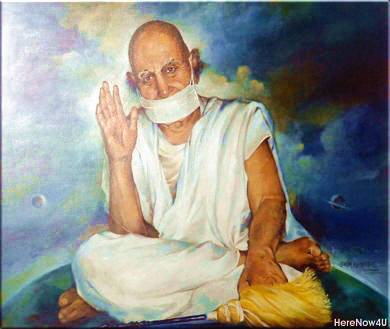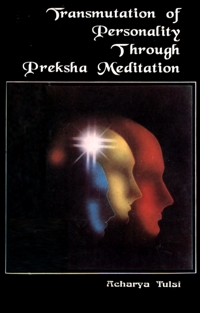
Can there be any salvation in this world?
Or any refuge or dignity, 0 Brother?
Even he who enjoys the wealth of the six continents,
Absolute power, yet suffers frustration! Why?
Great glory lasts as long as proud illusion endures,
Till life remains unswallowed by cruel death!
Horses, elephants, chariots, armies and great warriors
Are of little avail, when Death chooses to come!
Houses made of steel, yet is man afraid!
In humility bent! What might rescue him?
Neither ascending to the mountaintop, nor plunging into the sea,
Doth offer any protection against impending death!
The holding of the breath, and the practice of yoga,
Learning and magic, too, are here to mockery reduced!
Disease and old age come, the body grows inert
What medicine here can cure a man of these?
Yet a four-fold refuge is ever available to him!
The Enlightened, the Liberated, the Saints
And true and perfect Religion!
Salvation for reprobates, for the helpless, hope,
Loving care for the orphans, for the drowning, a hand
A friend to the friendless, to the abandoned, a brother,
The saviour of all, whether rich or poor!
The illusion of taking the transient for the eternal is the result of delusion. The cause of delusion is the illusory nature of one's approach. On account of a perverse point of view, a man's conceptions go awry. One aspect of those conceptions you have cleared up. But there must be some other aspects, too. Will you kindly talk about these?
When the mortal is taken to be immortal, it is a patently false approach. Similarly, to look upon that which has no refuge as a haven betrays an illusory perception. Man seeks protection in material objects and thus further sinks into delusion. If we go into it deeply, we shall find that none in the family, society and the country, can give salvation to man. To begin with, it seems that the greater the extension of relationship, the more solid is one's base, but even those things which, in the process of their acquisition, seemed to offer lasting joy, are later found to be wanting. What seemed to offer salvation later appears to bring damnation. That some person or thing might bring us salvation at the time of calamity, or in the moment of death, is a false belief, and one must come to see it as such.
The empire and the army are considered to be saviours. But neither the empire nor the army can save a man about to be swallowed by death.
Genghis Khan greatly feared death. Because of this fear he killed millions of people. The kith and kin of the killed became his enemies. His fear increased. A sentinel was appointed for his protection. But Genghis Khan grew suspicious of him. Another sentinel had to be appointed. But growing suspicion necessitated an increase in the number of sentinels. However, Genghis Khan was not reassured even when seven sentinels kept watch for him. He sat all night with a sword in his hand.
He had left his royal palace for sometime and lived in tents with his army. One night he dozed off for a while. At that very moment, a horse tied to a nearby post broke loose. It caused a tumult. Genghis Khan woke up with a start. He thought the enemy had assaulted. In great panic, he started to move out of the tent. While fleeing he stumbled over a spike. A pointed stake pierced his stomach and he died. Genghis Khan had the tent with stakes erected for his safety, and yet his very means for salvation were responsible for his death.
Is it possible to stall death?
For thousands of years, the avoidance of death has been contemplated upon. Research is being carried out in this connection. Even today the scientists are occupied with this problem. They say death can certainly be stalled. In proof of their assertion, they say that the basis of life is healthy cells. These cells can be repaired and kept going in good order for a long time. As long as, a dying cell, after being rejuvenated, retains the capacity for division and for reproduction of a new cell, life would continue. The scientists have succeeded in replacing inert or dead parts of the body by transplanting in it new parts. They have also achieved success in heart-transplantations. But they have not been able to achieve victory over death. If, as claimed by them, they can stall death by rejuvenating the cells, it would create a great commotion in the world of philosophy and science. Right now it seems hardly possible.
Can death be stalled according to Jain philosophy? The scientists say that life is connected with the cells of the body. How does Jain philosophy react to it?
Jain philosophy is the philosophy of conquering death. The wished-for consummation lies in getting rid of the cycle of life and death. But this happens only in a state of perfect freedom. The soul wandering in the world has no deliverer; it will have to accept death one day, sooner or later. But the frontiers of death can be modified; untimely death can be avoided.
According to Jain philosophy, it is the vital energy that regulates life. In theoretical language, it may be called oja, the vital food. The cell begins its new life by taking the fertilized egg of the mother. This process is called oja har. As long as the effect of oja lasts, life continues. Oja is the name given to the atoms of the life force. Every living being in the first moment of its existence, receives these atoms. As long as this source remains active, death cannot occur.
There are chance happenings, which bring home to us the importance of the life-giving force. For example, a house fell and a person was buried under the debris. It took five to seven days to clear away the debris. And the man, when pulled out, still had life in him. He survived because his oja was secure. However, if the oja or life force itself had been hit, his life would have instantly ended. It was just a matter of chance. Everything depended on the preservation or non-preservation of the life force!
In the opinion of some people the practice of breath control leads to immortality. Is there any truth in it?
Life is connected with inhalation-exhalation. In view of this some monks go into deep meditation for long periods. But even this practice cannot save anyone from death. The use of learning and magic in this connection also does not prove effective. Some people build strong and powerful mansions for their security; others go to the mountain tops still others cross over the ocean, but nowhere is it possible to avoid death. Disease and old age are indicative of man's utter helplessness and lack of security. In the case of the body getting ill, recourse is taken to the vaids, doctors and medicines. By these means some diseases get cured. Yet the fact remains that in spite of these facilities, many diseases are incurable. When the life force or bioelectricity in an organism gets weakened, doctors and drugs become meaningless. If, doctors and medicines could prolong life endlessly, death itself would have died.
Sometimes towards the end, a drug is administered which makes even a moribund man speak out, but its effect does not last for long. Similarly, a lot of research is being done to stall old age. However, these efforts have not as yet yielded any satisfactory results. This much, of course, is possible that old age should be free from pain or its arrival delayed.
Disease and old age are painful conditions from which none can deliver us. How can then mortal chance offer any protection? The only means to salvation in this atmosphere of uncertainty is constantly awakened consciousness. In other words, a man's own soul is his only refuge.
I seek refuge in the Enlightened Ones;
I seek refuge in the Liberated Ones;
I seek refuge in the Saints;
I seek refuge in Religion, the Way of Salvation
this fourfold refuge is symbolic. The enlightened, the accomplished, the monks and religion symbolise four forms of the soul. Excepting these, nothing in this world can ensure salvation. Through constant contemplation of the total absence of salvation in this world, it is possible to neutralise concepts, which only serve to increase delusion.
 Acharya Tulsi
Acharya Tulsi
